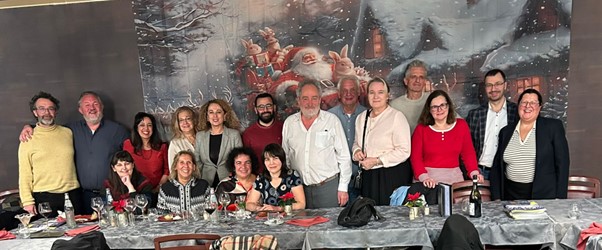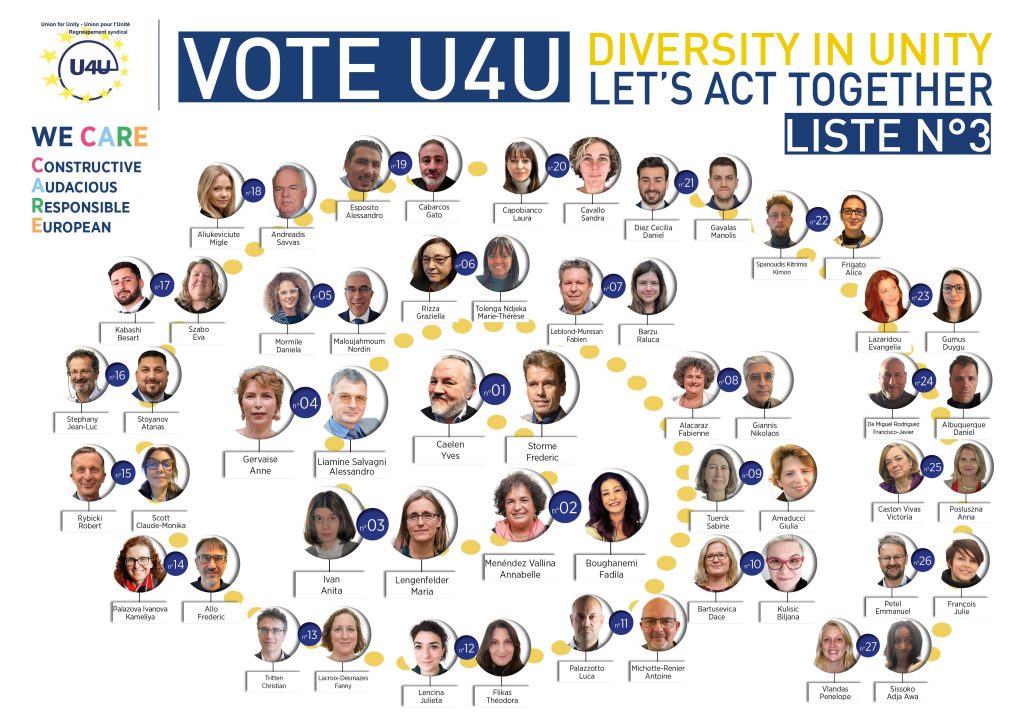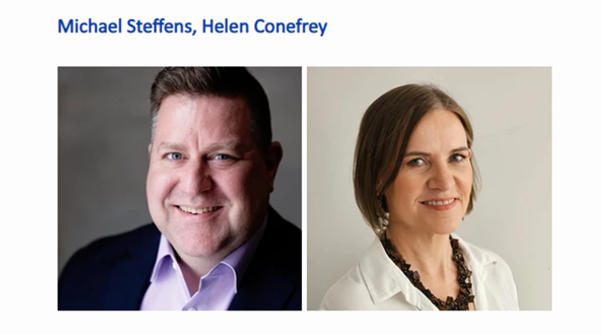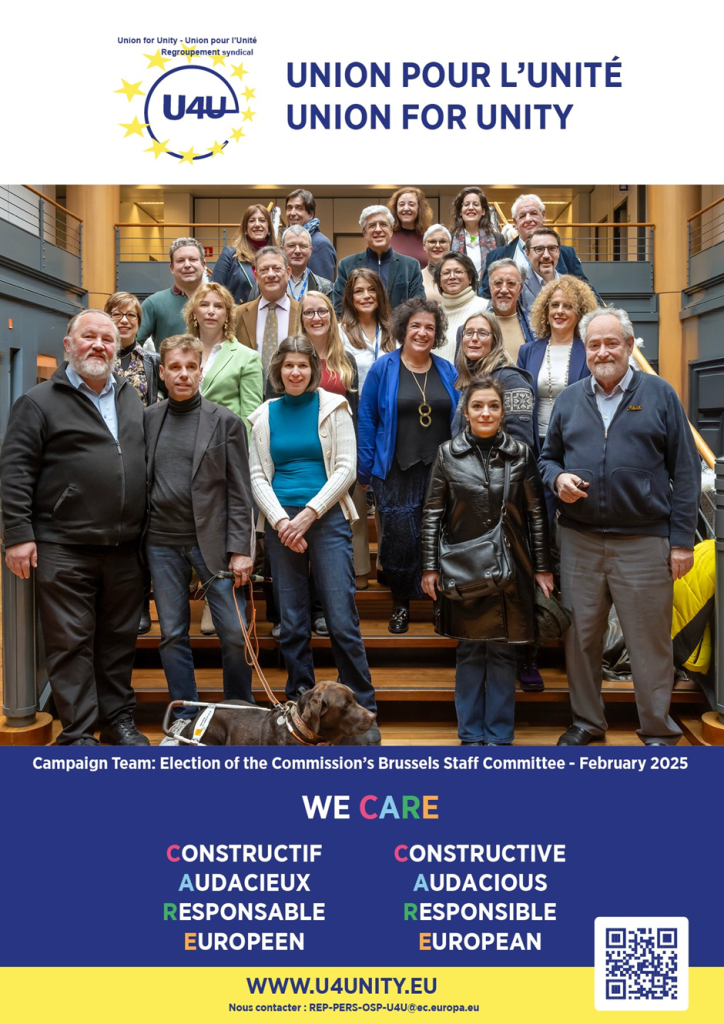Best wishes for 2025!

If Europe is to continue to move forward, our unity and our diversity are more necessary than ever. Let’s face the challenges of 2025 together. U4U stands with you and wishes you all the best.
Election of the LSC in Brussels – Why choose U4U (Union for Unity)?
LIST 3 – Give us more weight by voting for the list as a whole

The elections for the Brussels Local Staff Committee (that is responsible for representing colleagues working in Brussels, but also in most representations in Member States and at the Veterinary Office in Grange) will take place starting from 13 February 2025.
For these elections, we consistently position ourselves and act based on our principles and values.
We stand for a strong European Union serving its citizens, for staff unity, and against corporatism, individualism, and exclusionary ideologies.
We address all aspects of staff careers, organisational structures, and working methods.
We also advocate for European education for our children and for evolving the European Schools model to achieve greater openness to the whole society.
We support initiatives encouraging staff engagement in local and national life in their place of work. Furthermore, we promote a strong policy of inclusion and diversity in the workplace.
We also position ourselves in favour of a strong policy of support for the inclusion of diversity in the workplace.
Finally, we oppose the proposed staff regulation reform, which threatens to weaken the European civil service.
In this context, we present a clear and structured programme, broken down into six key points, which we commit to supporting throughout the three-year mandate you may entrust to us:
1. CAREERS FOR EVERYONE
We aim to ensure greater equality of treatment and better career prospects for all, prioritising AST/SC staff and those on precarious contracts (contract agents or temporary staff).
Specifically, we propose to:
- Strengthen mobility opportunities for all staff (including those on precarious contracts), within the Commission and between the Commission, agencies, and executive agencies.
- Promote organised mobility, including for interpreters and translators, as well as at the inter-institutional level.
- Maintain a diversity of recruitment methods while safeguarding primary recruitment through external competitions. Expand the Junior Professional Programme (JPP), allowing promising colleagues to transition from contractual to permanent positions through internal competitions.
- Improve accessibility to recruitment competitions for people with disabilities.
- Enhance communication and support for contractual and temporary agents to help them succeed in annual internal or external competitions, securing their permanent positions.
- Create better reclassification opportunities for contractual and temporary agents.
- Regularise the process for upgrading AST/SC staff to AST every two years.
- Develop robust talent detection policies to better highlight staff expertise and skills.
- Emphasise the meaningfulness of our work to boost staff motivation.
- Encourage varied career paths that enrich knowledge and skills.
- Promote rewarding non-management career options, particularly for those over 55.
- Combat the ongoing “social dumping” within the Commission, where some staff are placed in grades that do not reflect their qualifications or work content.
2. MANAGERS WHO CARE AND TAKE RESPONSIBILITY FOR PEOPLE
We want to improve working conditions and management practices to enhance motivation and well-being at work.
Managers are accountable for the financial or legal implications of their decisions. These questions are therefore the subject of the greatest attention on their part.
But are they equally mindful of their human impact? Do they receive the necessary tools to address these dimensions?
We prioritise:
- Combating harassment and all situations or behaviours detrimental to individuals and teams.
- Strengthening managers’ proximity roles and equipping them with tools for humane management.
- Providing teams with adequate human resources, because understaffing is a clear cause of tension and unease at work.
- Encouraging participative management methods.
- Promoting inclusion and diversity (social, societal, and cognitive).
- Embedding inclusion and diversity into recruitment and training processes for managers.
- Offering more support for colleagues facing specific challenges (e.g., disabilities, single parents, illnesses, etc.).
3. WORKING CONDITIONS THAT SUPPORT HEALTH AND WELLBEING
We aim to ensure a work environment conducive to health and well-being, alongside teleworking arrangements that foster teamwork and collective spirit.
Our priorities include:
- Establishing, maintaining, and expanding services (schools, nurseries, cafeterias, etc.) for staff.
- Addressing mental health issues, with a focus on prevention and risk assessment.
- Improving inclusion and creating an accessible Commission for everyone.
- Accounting for neurodiversity in the workplace.
- Enhancing health expense reimbursements and aligning caps with actual costs.
- Ensuring adequate human and material resources (offices, communication tools, etc.).¨
- Promoting voluntary, flexible, and adaptable teleworking while preserving teamwork.
4. EVOLVING WORK METHODS
We advocate better utilisation of talents, encouraging collaboration and fostering skills development.
Our key proposals are:
- Pooling human resources into project teams tackling cross-policy issues.
- Supporting multidisciplinary and inter-service approaches.
- Encouraging methods that inspire innovative ideas among staff.
- Expanding training initiatives beyond service-specific skills.
- Leveraging individual talents by reducing unnecessary hierarchical layers.
5. SOCIAL DIALOGUE
We strive to strengthen social dialogue practices and the role of unions within the Commission.
Specifically, we propose:
- Broadening the topics covered in social dialogue, allowing staff and their representatives to table their priorities.
- Synchronising local staff committee elections within the same quarter, ensuring the central committee can begin its work immediately with stable governance over three years.
- Basing social dialogue also on direct staff engagement within various Commission services.
- Increasing resources for staff representation, which are currently significantly insufficient.
- Boosting training and expertise available to staff representatives.
- Establishing staff committees at workplaces where none exist (e.g., Seville).
- Incorporating executive agency representation into the central staff committee. The executive agencies are actually almost services of the Commission (it is the Commission which appoints their directors, issues the rules which apply to them, etc.).
- Providing exemptions for staff associations dealing with disabilities, cultural activities, and education-related issues to enhance their community contributions.
6. NO TO A STAFF REGULATION REFORM, YES TO AN INCREASE IN BUDGET
Finally, U4U opposes any new staff regulations reform that, like all previous ones, would only erode rights and benefits, in particular, in the current political context.
The Member States pushing for a reform seek explicitly budgetary cuts and reduction of our social rights. This will endanger promotions, pensions, expatriation allowances, and the stability of the European civil service.
Asking for or encouraging a reform, as other organisations are doing, is to accept downward pressure, particularly on promotion rates, on the “accumulation rate” for pension contributions (which means that contributions will have to be made for longer to obtain the same pension rights), on expatriation and foreign residence allowances. This is a supplementary step toward precariousness of our civil service. This is also putting at risk the automatic method of calculating our salary adjustments as well as many other dimensions.
Pretending that a reform of the status could bring about improvements for any category of staff is the most dangerous illusion.
U4U advocates instead for improvements within the current staff regulations framework. As demonstrated by recent achievements (e.g., Luxembourg housing allowances, improvement discussed for contract and temporary staff) there is a strong, even if limited, possibility to obtain improvements for staff with this approach.
U4U also urges the Commission to secure a more ambitious multi-annual budget to tackle societal challenges.
It is clear that many challenges can only be effectively addressed at a European level: ecological transition, responses to the war situations that are tearing our continent and its neighbourhood apart, creation of a Europe of defence, definition and implementation of an industrial policy, promotion of territorial and social cohesion, etc.
The European civil service finds its legitimacy in its actions to achieve objectives that are useful to our societies. A European budget that is truly aligned with the growing responsibilities assumed by our institutions should also allow for the necessary dotation in human resources, which is not the case today.
2025 Elections to the Commission staff committee in Brussels
Our list

U4U participates in the elections of the Commission’s staff committee in Brussels.
For these elections, which will take place between 13 and 17 February 2025, U4U submitted a list of candidates reflecting the diversity of the staff and their professions.
By taking part to the vote, you will decide about the composition of the local committee of the Commission in Brussels, which represents a majority of colleagues working in Brussels, in the Commission’s representation office (with the exception of the one in Paris) and in Grange.
This election will also make it possible to designate the representation of the Commission’s staff committee in Brussels within the Central Staff Committee of the Commission as a whole, representing all the sites where the various services and directorates-general are located.
The role of the Staff Committee is important. The Committee ensures the application of the rules on staff management. It also appoints representatives to the various joint committees where the administration and the Staff Representatives sit, such as the promotion, teleworking, health care, professional inadequacy, discipline committees, etc. The Staff Committee finally expresses its views on the conduct and content of the Commission’s social dialogue.
Our list includes 54 colleagues, 27 full members and 27 substitutes.
It is composed of 31 women and 23 men who work in 27 directorates-general and services.
It includes 25 administrators, 11 contract agents, 13 assistants, 2 secretary/clerck (including 1 temporary agent) and 4 temporary agents.
These colleagues also reflect a very large number of professions and 19 nationalities. Finally, our candidates are representative of the societal and social diversity of the Commission’s staff.
Our candidates are committed to actions that respect our values and principles and our program.
There’s still time to sign the contract workers’ appeal

As part of the ongoing social dialogue process on the recruitment of temporary staff, we have proposed an approach – in line with the demands of the “Collectif des Contractuels” – to use these negotiations as an opportunity to improve the career opportunities and professional development of contract staff.
Giving contract staff better access to temporary posts is one way of giving them the prospects to which they should be entitled.
Becoming a temporary agent will give most of the Commission’s contract staff access not only to a better level of remuneration, but also to better prospects in internal competitions and even, provided that the necessary adjustments are made to the so-called “anti-cumulation” rule, to more opportunities to reach the ten-year career requirement for entitlement to an EU pension.
While it is clear that a measure to improve the prospects of contract agents gaining access to new posts would be a major step forward, it is also clear that a measure to improve the prospects of contract agents gaining access to new posts would be a major step forward.
While temporary posts will not solve all the problems faced by colleagues on precarious contracts, it is equally clear that such a measure would be a step in the right direction and would enable us to put other measures on the negotiating table.
In particular, a reform of the rules on access to temporary posts in favour of our contract staff would then open the door to new discussions aimed, for example, at allowing greater mobility between the Commission and regulatory or executive agencies, or even between permanent posts and temporary posts with the possibility of return, as is already the case in the Commission in the field of external action.
Any progress we could make in this area would benefit not only the colleagues directly concerned (who would be offered better career prospects), but also the teams in general (who would be less affected by the wholly unjustified turnover generated by the use of temporary staff) and the institution itself (which would have a better chance of retaining and developing the talent it so desperately needs).
With this in mind, we were the first organisation to fully support the proposals put forward by the Collectif des contractuels.
The discussions that have taken place over the last few months have proved us right, and in addition to the victories that we have already achieved in the discussion of the text itself, which we will report on once they have been fully validated and consolidated, we have seen several organisations join the positions that we have held from the outset.
Today, all representative organisations involved in the social dialogue seem to agree at least that improving the situation of contract agents should be a top priority for the European Commission and that this priority should be pursued at all levels where possible.
Unfortunately, some of these organisations are still clinging to the erroneous and dangerous idea that a strict limit on the number of temporary staff would make it easier to defend a permanent European civil service made up essentially of civil servants.
This is obviously a tragic error of perspective, given that the total number of officials that the institution can recruit each year is set out in a budgetary document (the establishment plan) which must be validated by Parliament and the Council, and any increase is therefore unrealistic in the current political and budgetary situation.
Too strict a limit on the number of temporary agents, especially without facilitating the transition from one career bracket to another (from contract agent to temporary agent and from temporary agent to official), can only lead to a deterioration in the working conditions of the agents concerned.
The risk is that a number of people who are currently being offered temporary contracts will only have access to less advantageous and even more precarious permanent contracts in the future.
So we still need you to support us in our discussions, not only with the administration, but also with the more ‘traditionalist’ staff representative organisations who are still struggling to find the right balance between the two.
Understand that defending a permanent civil service does not necessarily mean reducing the rights of the most vulnerable categories of workers.
Consultation meetings with the administration on the rules for the use of temporary staff will be concluded soon.
So, perhaps for the last time, we are calling on those of you (whether you’re a civil servant, a contract worker, a company employee or whatever your job is) who haven’t already done so to sign the Collectif des contractuels appeal, which is available here.
Reaching, or at least approaching, 10,000 signatures on this document would undoubtedly help us to strengthen the positions we have defended on this issue from the outset.
It would also confirm the values we defend, namely that a genuine defence of the European civil service can only work if all categories of staff are united.
In a context of increased political and budgetary pressure, where certain political forces and certain Member States are promoting a reopening of the Staff Regulations which, as on all previous occasions, can only lead to a deterioration in working conditions for all, it is only by showing total solidarity with the members of the most disadvantaged categories of staff that we will be able to truly defend the future of our entire public service.
We therefore call on our colleagues in the permanent civil service in particular to show their support by signing the call for contract staff.
Breaking news: the unions are preparing to ask for further dialogue with the European Commissioner. U4U agrees with this approach, in particular to ask for an anti-cumulation rule that would limit the accumulation of contracts to 9 years instead of the current 7 years.
For the improvement of temporary agents (TA) but also for contract agents (CA)
The General Implementing Provision (GIP) on Temporary Agents (TAs) offers an opportunity for improvement not only for TAs but also for Contract Agents (CAs), of whom there are almost 12,000 in both categories. It is therefore the new career development opportunities that the TA decision in preparation could offer to contract agents that our organisations wish to focus on in this final stage of technical concertation. Below are the joint comments made by U4U, USHU and GEN 2004 to Mr Quest at this stage of the social dialogue.
Note for the attention of Mr Stephen QUEST, Director General HR Subject: DGE Temporary Agents
Dear M. Quest,
Further to our communications of 5 December and with a view to the next technical consultation meeting on the new “Temporary Agents” decision that is being prepared, we are sending you our final comments at this stage of the social dialogue.
We would like to draw your attention to the following points:
- The DGE on Temporary Agents (TAs) offers improved opportunities not only for TAs but also for Contract Agents (CAs), of whom there are almost 12,000 in both categories. It is therefore the new career development opportunities that the TA decision in preparation could offer to contract agents that our organisations wish to focus on in this final stage of technical concertation. In particular, we have the opportunity to offer them better access to more favourable employment conditions and more opportunities to take part in internal competitions.
- The role of the CAs is essential for the smooth running of the services. Therefore, as Vice-President Georgieva said more than 7 years ago, they deserve a good career with prospects for development and mobility, including inter-institutional mobility.
- Such an approach is also included in the Commission’s new human resources strategy, which stresses the need to “guarantee career prospects for all categories of staff”.
For this final stage of the social dialogue, in which much progress has been made, we would like to make the following clarifications:
CLEARER INDICATION OF THE CAREER PATH TOWARDS THE ROLE OF TEMPORARY AGENT
A better indication that CAs benefit from career prospects in TA: it seems to us that it would be sufficient to include in the text of the DGE the indications made by the administration in response to our requests on this subject on 5 December: “DG HR recognises the value of retaining talented CAs under TA contracts to enhance career prospects and make efficient use of internal resources, in line with the HR strategy commitment to provide tangible opportunities for CAs”. We therefore ask that this opportunity be explicitly mentioned in the text of the DGE (in particular in Article 8 of the DGE).
REGULAR INTERNAL COMPETITIONS
Confirmation of the annual rate of internal competitions: it would be sufficient to state that this is the objective to be achieved, while deleting the words “where feasible” in recital 10. The resulting tautology (the mention of an objective to be achieved is sufficient here to indicate a limit) casts serious doubt on the real intentions of the institution. It should be remembered that this annuality is already induced by the organisation of the “young professionals” program.
This annualisation in no way excludes the organisation of external competitions, which could provide, for example, 75% of new officials.
MAXIMUM DURATION OF NON-PERMANENT CONTRACTS
Finally, if this new approach is not to be a sham, the rule against overlapping contracts must be amended to allow for a longer period:
– or by rewording it, as we have already requested in previous interventions, to reach, for example, a maximum of 12 years (in principle a maximum of 6 years as a contract agent and a maximum of 6 years as a temporary agent), taking into account the needs of the service.
– or by clarifying the principle of its flexible implementation in the GIP, taking into account the needs of the services and explicitly stating that this flexibility will apply in particular, including for 3ter/3b contract agents, in cases where a temporary contract succeeds a contract agent contract.
In general, only by agreeing either to amend the anti-cumulation rule directly in the decision in question, or to make an explicit and precise exception for the succession of an AT contract to an AC contract, will we send the clear signal that contract agents expect us to deliver on the promises of the HR strategy.
UNDERESTIMATED RECRUITMENT
Finally, we would like to return to Article 11 of the DGE proposal, which sets very low recruitment levels in relation to the experience required. We understand that these levels are imposed on you by DG BUDG’s cost calculations. However, we continue to believe that budgetary constraints, however real they may be, should not open the door to social dumping in recruitment.
It’s time for the institution to build on the work it has done and to receive from the budgetary authority the resources it needs to function properly.
Thank you in advance for your consideration of the points raised in this note.
For G2004 For the Regroupement syndical
(U4U/USHU) Thomas Weber Georges Vlandas / Helen Conefrey
President President
Brussels, 20 December 2024

Survey on the Joint Sickness Insurance Scheme (JSIS)

The Joint Sickness Insurance Scheme (JSIS) is the common sickness insurance scheme for staff and officials of the European Union.
In particular, it covers the primary health care needs of several dozen staff, officials and pensioners of the European institutions.
In order to better defend your interests as staff representatives in the various bodies concerned (Staff Committee, Management Committee, social dialogue meetings, etc.), we would be grateful if you could tell us more about your experiences, your satisfaction and any problems you may have with this service.
We therefore invite you to complete the short questionnaire (10-15 minutes) available here.
Regionalization – What is in store for EU DEL?

For decades, Delegations have been the voice of the European Union to national authorities and their citizens in host countries. The European Union Delegations (EU DEL) are an enviable network for promoting EU interests and helping partner countries achieve their development goals. But a major shake-up is on the horizon, with implications for all Commission and European External Action Service (EEAS) staff and the risk of weakening the EU in the world. An article published by USHU explains why.
In any change management process, there will be casualties. Posts will be frozen and eventually suppressed. Expatriate Staff will be redeployed from one EU DEL to another or repatriated to HQ. Local Agents will be dismissed. No need to sugar-coat the impact.
DG INTPA plans to regionalise Delegations and create up to eighteen regional hubs in an effort to be more efficient and effective. EU Delegations are in the spotlight as Managers aim to be geopolitical, more efficient, more effective and yes, more strategic. Whilst NO decisions have been taken yet, USHU firmly believes that Trade Unions and elected staff representatives must be fully consulted. Any restructuring will have an impact on all staff categories including Local Agents, Contract Agents, Temporary Agents and Officials.
We need a meaningful exchange with HQ managers on the future of the EU DEL network. Failure to communicate with staff is not an option!
There will be both opportunities and casualties therefore USHU has requested the Commission and the EEAS to organise a social dialogue meeting to inform all Trade Unions of what lies ahead for EU Delegations. Local and expatriate Staff who have served the institution well and loyally for many years, deserve to have greater clarity over their future. Expatriates working in EU Del commit both themselves and their dependents and need to know what is around the corner. Local Agents must safeguard their livelihoods and need to know how secure their jobs really are!
We encourage colleagues to provide their views by contacting us on our functional mailbox REP-PERS-USHU@eeas.europa.eu .
The new Commissioner for INTPA needs to ensure that the EU Delegation network delivers on its development goals including Global Gateway and the growing use of new instruments such as EFSD+ in the context of budgetary constraints. Any change process must be handled transparently and humanely to ensure that staff have access to information and a level of certainty for their professional future.
Reorganization will be centred on the specialisation of activities. Policy-focused activities will be implemented by specialised INTPA sections in EU Delegations, who will no longer be responsible for the execution of the budget and will focus primarily on policy issues and policy dialogue. Business relating to the management of external programmes will be pooled into a system of regionalised “INTPA Budget Implementation Hubs”.
The new look for DG INTPA in EU Delegations
Current Cooperation Sections will become “Partnership Sections” and be resourced by a small team of INTPA staff within each EU Delegation. Typical teams will include a Head of Partnerships, one or two Partnership officer(s) (CAs), and two to three local agents (e.g. Liaison Agent, secretary, …). There will be an assessment of the size needed to operate in country and this will be based on efficiency considerations rather than political factors. Not all EU DEL will necessarily have Partnership sections.
EU Delegations will continue to serve as the main entry point for day-to-day, country-specific engagement with local partners, ensuring their role in managing relations in country, even as progressively operational and F/C functions are moved to regionalised hubs. The Head of Partnership and the Head of Delegation would remain in charge of managing relations with the authorities in each country. This structure would require close coordination between EU DEL and regional INTPA Budget Implementation Hubs.
Partnership Sections would function under the leadership of the Head of Delegation. The One Delegation principle will be applied further as all staff (including INTPA Commission staff) must be available to work on any tasks allocated by the Head of Delegation. Heads of Delegation will become more involved in strategic decisions and will be expected to attend INTPA Strategic Steering Committees.
INTPA Regional Budget Implementation Hubs
The location of the hubs will be decided upon the strategic importance, connectivity and accessibility, cost effectiveness, safety and quality of life, time zones, infrastructure and network synergies present in the host countries.
USHU’s take on the proposed regionalisation strategy
The proposals will profoundly change the way we work. We ask how this will affect the essence of our work, the understanding and the expertise that is gathered on the ground. If members of staff working from a third country (the regional hub) are getting involved in identification and formulation processes as well as project management and oversight remotely, without having regular access to a local network, it is questionable whether the same quality of work can be achieved. Claims this could be mitigated by frequent missions to a country, are unconvincing as we know what it takes to have regular exposure to local counterparts (national authorities, implementers, other donors, civil society, experts, etc.) and how critical this is to our everyday tasks and results.
Regionalisation could weaken the EU in the world and undermine the effectiveness of development cooperation. The geopolitical influence of the European Union could be weakened rather than strengthened.
Future staffing and job opportunities in EU DEL
Non-hub EU DEL will face considerable job cuts. Hubs will have additional posts. Overall costs will be lowered and there will be considerable disruption for both Local Agents and Expatriates. There will be fewer opportunities for officials in EU Delegations as AD/AST posts are reduced worldwide.

17/12/2024
Impartiality in evaluation procedures
The General Court of the EU reminds the EEAS of common sense

It took several months of proceedings to reach this conclusion, which may seem obvious: if a staff member’s superior is the subject of an administrative investigation for harassment, there may be doubts about his or her impartiality in drawing up the staff member’s staff report.
It is for this reason that the Court of First Instance, in a judgment of 4 December 2024 (in case T-158/23 Colombani v EEAS), annulled in its entirety the evaluation report drawn up by our colleague J.-M. Colombani for the year 2021.
The Court found that the mere fact that an investigation into possible harassment was under way (without any conclusion having been reached by the authority responsible for the investigation at the time when the disputed staff report was drawn up) was such as to give rise to a legitimate doubt as to the possible bias of the applicant’s immediate superior in the exercise of his duties as an assessor.
He added that these doubts as to the assessor’s impartiality were of a “subjective” nature: “In other words, the circumstances referred to above were sufficient to give rise to them and no argument aimed at establishing the lack of “subjective” impartiality on the part of the applicant’s immediate superior could be accepted.
This is a landmark judgment that we will certainly be reminded of every time we are faced with similar situations.
Self-assessment Process: A Guide for Jobholders

The annual self-assessment exercise offers a unique opportunity to reflect on past achievements, identify areas for growth, and set a clear direction for the future. Within the European Commission, this process is not merely a formality but a cornerstone of career development and professional transparency.
A challenge for many Employees
For some individuals, the annual appraisal process can be a particularly difficult experience, often tied to negative past encounters. It’s not easy to sit across from your manager and listen to a list of supposed mistakes made throughout the year. Instead of being a celebration of progress and growth, it often feels like a moment of reckoning where hidden criticisms come to light. This perception can lead to weeks of unnecessary stress. Frequently, these issues stem from simple miscommunication or misunderstandings, which could have been clarified at the time but were left unaddressed. The result? A surprising and disheartening list of “failures” unveiled during the appraisal discussion.
Unfortunately, this is not an uncommon scenario. Many colleagues have shared in private conversations that they feel the need to save emails and other documentation throughout the year—both highlighting their successes and defending their actions in challenging situations—knowing they may need to justify themselves later. Such environments can be especially daunting for introverted employees or those unaccustomed to these dynamics from previous workplaces.
In some cases, employees report receiving no negative feedback all year, only to be blindsided by an “unsatisfactory” appraisal rating. These situations highlight the importance of fostering open communication throughout the year to prevent misunderstandings and build mutual trust.
A call for proactive measures
It’s crucial for both employees and managers to take steps to avoid these scenarios. Managers should provide regular, constructive feedback and create an environment where employees feel comfortable discussing concerns or misunderstandings as they arise. Staff, on the other hand, can benefit from keeping track of their achievements and being proactive in seeking feedback.
By addressing issues early and maintaining open communication, the appraisal process can become less of a source of anxiety and more of a meaningful opportunity for growth and development.
Reframe the process
The key to reducing stress is changing your perspective. Instead of viewing the appraisal as a test or critique, consider it a structured conversation. It’s your chance to:
- Highlight your achievements and contributions.
- Clarify your manager’s expectations.
- Collaboratively set objectives for the future.
By focusing on these aspects, you can walk into the meeting with a sense of purpose and control.
Preparation is Everything
A well-prepared employee is a confident one. Start by:
- Writing Your Own Review: Draft a self-assessment based on your objectives and progress. This serves as a guide for the conversation and highlights your understanding of your role.
- Maintaining an Achievements File: Keep a running list of projects, accomplishments, and feedback throughout the year. Use hard evidence, such as emails or internal reports, to substantiate your contributions.
- Reflecting on Your Achievements: Make a concise list of key successes, challenges overcome, and skills acquired. Be as specific as possible, focusing on measurable results.
- Anticipating Feedback: Identify areas where you may have struggled and prepare responses that show your willingness to improve.
- Clarifying Your Goals: Consider your career aspirations and how the organisation can support them. Articulating this shows initiative and forward thinking.
Address Concerns Early
Nothing is more frustrating than discovering issues during the appraisal that were never raised before. Avoid this by:
- Requesting regular feedback throughout the year to stay informed about your performance.
- Suggesting periodic check-ins with your manager to discuss progress and address concerns proactively.
Manage Appraisal Anxiety
Feeling nervous is natural, but there are ways to mitigate pre-appraisal stress:
- Practice Makes Perfect: Rehearse the conversation with a trusted colleague or mentor.
- Focus on Facts: Keep your thoughts grounded in facts rather than letting your mind jump to worst-case scenarios.
- Avoid Emotional Reactions: Stay calm and professional, even when receiving critical feedback. Remind yourself that constructive criticism is an investment in your growth.
- Prioritise Self-care: Ensure you are well-rested and relaxed in the days leading up to the meeting.
Engage Constructively During the Meeting
When the appraisal begins, remember these tips:
- Listen Attentively: Show that you value your manager’s input by taking notes and avoiding interruptions.
- Be Honest: If you disagree with feedback, share your perspective respectfully and back it up with evidence.
- Stay Positive: Frame challenges as opportunities for growth and seek advice on how to improve.
Follow Through After the Appraisal
The meeting is only the beginning. To make the most of the feedback:
- Review and reflect on your line manager’s comments.
- Develop an action plan to address areas for improvement and share it with your manager.
- Request a follow-up meeting if serious issues were raised to clarify expectations and create a detailed improvement plan.
- Schedule follow-up discussions to monitor progress and refine goals.
Conclusion
The annual appraisal doesn’t have to be a source of anxiety. With the right mindset and preparation, it can be a valuable opportunity for growth, alignment, and professional progress. Remember, the aim of an appraisal is not perfection but meaningful development. Approach it as a dialogue rather than a judgment, and you’ll leave the process feeling empowered and ready to take on the year ahead.
EASA: U4U in 2024 and outlook for 2025

U4U has initiated a series of meetings focusing on a number of issues specific to the European Aviation Safety Agency (EASA). Where do we stand and where do we want to go from here?
As your Union, U4U is dedicated to representing and advancing the interests of all EASA staff members through constructive dialogue with the Administration.
Our approach is rooted in fostering a positive social dialogue with all partners, working in close collaboration with the Staff Committee to ensure a unified and effective voice for staff.
Through this meaningful dialogue, the Agency successfully overcame its social crisis in 2022. U4U initiated a series of meetings focused on several issues specific to EASA and, most importantly, on the main concerns raised by you during the staff direct and collective expression exercise held in June 2023.
With the restoration of social peace within the Agency, we are proud to share key achievements and ongoing initiatives that highlight our collective efforts to improve our working environment and support our professional community.
Achievements
- Removal of the Second CAP on Schooling Fees
Through sustained engagement and dialogue, we successfully achieved the removal of the second CAP for schooling fees. This significant outcome provides financial relief for many colleagues, reflecting our focus on addressing practical concerns. - Welcome Package for Newcomers
In collaboration with the Administration, we have ensured that new colleagues now receive a welcome package, designed to facilitate their integration and foster a sense of community from their first day.
Collaboration for EASA’s Long-Term Success
U4U works alongside the Staff Committee, supporting and benefiting from EASA’s Staff Committee participation in the AASC (Inter-Agency Staff Committee) to act in the best interest of all colleagues and:
- Advocate for adequate budget allocations and mitigate workload challenges in discussions with the European Commission.
- Support the Administration in addressing resource and workload concerns effectively, ensuring the Agency’s long-term success.
These efforts are underpinned by the strong and constructive social dialogue maintained with all stakeholders, enabling us to tackle challenges collectively.
Enhancing Workplace Well-being
U4U continues to prioritise a safe and respectful workplace environment. Guided by the charter signed by senior management, and with the Administration’s positive involvement, we are working to refine EASA’s Anti-Harassment Processes. These refinements aim to ensure fairness, transparency, and well-being for all staff members.
Looking Ahead
- New Mission Guide: U4U is closely monitoring the development of the new Mission Guide, anticipated by the end of Q1 2025. This document will shape travel and mission practices, and we are committed to ensuring staff perspectives are considered for its implementation at EASA.
- Direct & Collective Expression Exercise (Post-Summer 2025): To maintain an effective ongoing feedback mechanism, U4U has proposed that the Direct Expression Exercise be repeated after summer 2025. This timing reflects the reorganisation initiated by the Executive Director and the upcoming ICAO Audit. This initiative should be conducted in partnership with the Administration and HR.
At the start of 2025, U4U@EASA would like to express our heartfelt gratitude for your trust and active engagement throughout the year. Together, we have made meaningful progress, demonstrating the strength of collaboration and constructive dialogue.
May 2025 bring new opportunities, continued growth, and strengthened solidarity within our EASA community.
Let us enter the new year with optimism, determination, and a shared commitment to building on our successes and addressing future challenges together.
In solidarity and with warm holiday wishes,
The U4U Team
Julien Colinos, Georges Vlandas,
Vice-president President
13/12/2024
The Barcelona Fusion for Energy Agency (F4E): where do we stand?

As part of the social dialogue, U4U, together with EPSU-Fusion colleagues, reminded the Executive Director of the Barcelona agency of the concerns of its staff.
Dear Marc,
The last weeks, and even the last year, have seen many exchanges, including social dialogue meetings, between the unions and F4E Staff Committee (individually and collectively) and EC Commissioners, F4E Director and F4E Admin.
Valid concerns have been raised with regard to:
• the rate of change at F4E;
• survey results which indicate a deterioration of staff perceptions of the F4E management in a number of areas including leading by example;
• the re-organisation and especially the process followed to fill positions.
The EC proposed various actions to expedite change at F4E and insisted on a schedule to complete the reorganisation by the end of 2024 – a schedule considered by many to be inconsistent with the applicable rules, especially considering your decision to appoint Department Heads before proceeding with the lower levels of management.
Re-organisation
The new organisation came into effect on July 1st and it is slowly becoming operational with the appointment of managers at all levels and the establishment of a stable management team.
However, there is a lack of transparency and consistency on the basis for deciding between nominations (provisional or otherwise) internal and external recruitments. Regardless of whether the recruitment practices may be within the letter of the law, considering the context and history of F4E, they must also be seen to be transparent, backed-up with written procedures and consistent with the new culture that you want to develop at F4E.
In addition, there seems to be a reorganisation ‘fatigue’ amongst F4E staff as the discussions started more than 1 year ago. It is important now to give the staff some feedback – a status update and to explain clearly the expected benefits of the new organisation. In this context, we think that a new opportunity should be provided to F4E staff for an “expression directe” in 2025.
Alignment of new organisation with Objectives
It is not clear that all departments and units have been established and are appropriately resourced in terms of numbers if staff and skills to meet their objectives and assigned tasks. We raised this concern many times in the past.
F4E should now demonstrate that staff allocation is performed with clear criteria and that resources match priorities and not as happened in the past (this is one of the key points coming from the psychosocial surveys).
In this context, we should also like to understand the new roles of a number of ex-managers and staff who were formerly in ‘acting’ management positions.
Policy Outlook
Reorganisation aside, it is important for F4E to start looking forward to the real challenges coming up. The discussions on the next MFF will start in 2025 and F4E should prepare for demonstrating progress in ITER and the other projects under its responsibility, as well as operational efficiency and its added value in the development of a European fusion programme. We urgently need a discussion on these issues, based on a proposal by the organisation explaining how it sees these challenges and how it envisages to tackle them successfully, ensuring a long-term mission for F4E and its staff.
Staff reinforcement and “offset” operations
We are extremely concerned by the so-called “Offset scenarios” presented at the last social dialogue meeting, indicating that F4E may have to give back positions under the frame of the conversion of CAs to TAs or the short-term posts. We have been reassured by the last 3 directors ( Jean-Marc, Pietro and yourself) that the return of CA converted positions will never imply the dismissal of colleagues with indefinite contracts, and that HR would monitor the non-occupied positions of CA in order to be returned. During the meeting, it would seem that F4E opened the door to other possibilities. This topic must be addressed urgently and in detail in full transparency and with a clear strategy.
Until now EPSU-Fusion / U4U took the constructive position to allow time to re-organise and change the culture of F4E. In this context, we now consider it timely for you to clearly set out your policies to address the points above.
We look forward to supporting change in F4E and propose a series of social dialogue meetings to progress urgently on these topics in Q1 of 2025.
We look forward to focused, constructive and respectful dialogue.
Best regards
Brian Macklin Georges Vlandas
FSESP-Fusion (USF) U4U

29/11/2024
2025: Election of the Brussels Staff Committee
From February 13 to 17, 2025, the next elections will be held to elect our next representatives to the Brussels Staff Committee. The main role of the Staff Committee is to represent the interests of the staff towards the institution and to contribute to the smooth running of the services. The U4U Campaign Team is ready to take on this role and protect your interests. We have also received the necessary number of nominations to propose a full list (see article above).

U4U, serving you better!

| U4U’s main resolution is to serve you even better. To achieve this, we have created direct links between you and the team that can best help you. So : – If you require personal support, please email to HR-REP-PERS-U4U-ASSISTANCE-INDIVIDUELLE@ec.europa.eu – If you would like information about training or coaching, please email to training.u4u@gmail.com – If you would like to contact colleagues in Luxembourg, please email to rep-pers-osp-u4u-lu@ec.europa.eu – If you would like to contact colleagues in the European Parliament, please email to u4u@europarl.europa.eu – If you wish to contact colleagues in the External Service, please email to u4unity@eeas.europa.eu – If you have any other questions, please send an email to our general mailbox: rep-pers-osp-u4u@ec.europa.eu We invite you to visit our website frequently and to join our Facebook page so that you have easier access to the latest news from the union about the training/coaching/workshops on offer, the conferences/cultural walks in Brussels and the events we organise throughout the year, as well as more general information about our statutes and our articles and reflections on the issues that concern us all. |